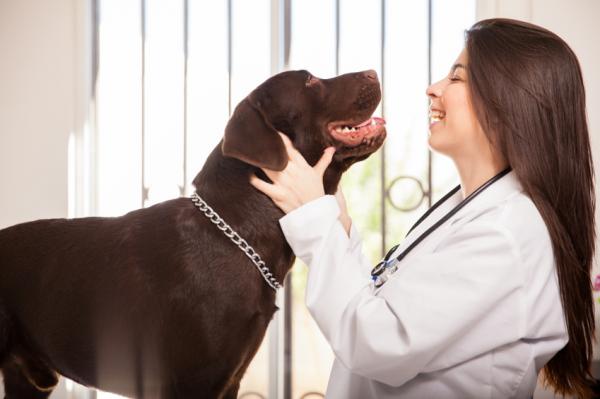Drugs that have been approved for human use have been clinically thoroughly tested, however, they are often withdrawn after release due to the occurrence of potentially dangerous side effects that were not evident during the clinical trial phases.
If the effects of certain remedies studied in humans can be so great, imagine the danger they would pose in exposing your pet to it, if you decided to treat it with the medications you usually use.
- The processes of pharmacodynamics (mechanism of action and pharmacokinetic effect) and pharmacokinetics (liberation.
- Absorption.
- Distribution.
- Metabolism and elimination) are very different in the human body and in the body of the dog.
- Therefore.
- A bad action by the owner can lead to the risk of the life of the dog.
- In this Animal Expert article.
- We’ll show you the 4 banned human drugs for dogs.
Acetaminophen belongs to the pharmacological group of NSAIDs (nonsteroidal anti-inflammatory drugs). Some sources say that NSNA cannot be administered to dogs, however, this group includes many active substances and it is possible that some of them are suitable to treat any canine condition, even under veterinary prescription.
On the other hand, if there is an anti-inflammatory of these characteristics that cannot be administered to a dog in any case is acetaminophen, which is potentially dangerous because of the damage it can cause to the liver.
Administration of acetaminophen to a dog can severely damage your liver, liver failure can lead to death and it is also possible to destroy most red blood cells.
It is an active ingredient that also belongs to the INSINAS group, is more anti-inflammatory than acetaminophen but has less capacity to reduce fever. Its usual and dangerous use in humans often makes us think of this anti-inflammatory as an option to treat our dog when he has pain or difficulty moving.
However, ibuprofen is toxic to dogs in doses greater than 5 milligrams per kilogram of body weight, meaning that an adult ibuprofen tablet (600 milligrams) would be fatal for a small dog.
Ibuprofen poisoning is caused by vomiting, diarrhea, loss of appetite, kidney failure, liver failure and even death.
Benzodiazepines alone form a pharmacological group in which active substances such as alprazolam, diazepam or diplastic chlorazepate can be distinguished. These are remedies that, in humans, are used as powerful sedatives of the central nervous system, being prescribed in cases of anxiety, nervousness or insomnia, among others.
Some benzodiazepines, such as diazepam, are used to treat epilepsy or anxiety, however, only a veterinarian can prescribe the use of this medicine.
Therefore, many people consider it appropriate to give this type of medication to their pet when restless or suffering anxiety, but benzodiazepines cause nervousness and panic attacks in dogs, in addition to being very dangerous to the health of their liver. .
Interestingly, benzodiazepines have been manufactured with the aim of having a higher therapeutic margin than barbiturates, however, in dogs the opposite occurs, barbiturates are used as they are safer, provided that they are administered under veterinary prescription.
There are many types of antidepressants, although the most well-known are selective serotonin reuptake inhibitors (SSRIs), a group in which active substances such as fluoxetine or paroxetine can be distinguished.
Not only do they directly affect the health of the dog’s kidneys and liver, but they can also disrupt the proper functioning of your nervous system, which is detrimental to your pet’s health.
If you want your pet to enjoy a complete state of health and well-being, it is essential that you never treat it yourself, without even resorting to veterinary remedies, since in many cases it can mask a serious illness that requires a specific diagnosis and treatment. Impulse.
To avoid unnecessary accidents that may cost your puppy’s life, be careful and consult your veterinarian when you notice symptoms of illness in your puppy.
This article is for informational purposes only, in Animal Expert.com.br we cannot prescribe veterinary treatments or make any kind of diagnosis. We suggest that you take your pet to the veterinarian in case of any type of condition or discomfort.
Se deseja ler mais artigos parecidos a , recomendamos-lhe que entre na nossa seção de Prevenção.

